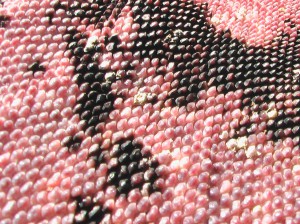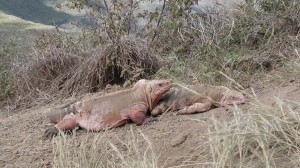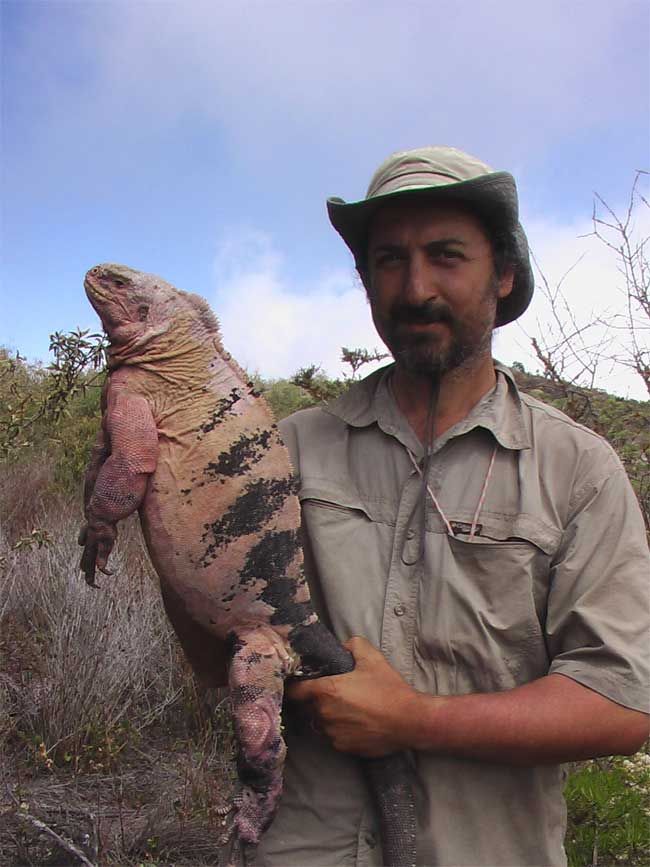Since 2003, the University of Rome “Tor Vergata” has been continuously serving as partner and advisor of the Galápagos National Park Directorate. Together, we conduct conservation-oriented research instrumental for the definition and implementation of conservation strategies of Galápagos iguanas.
By mobilizing more than 1 Million $ over the years, we investigated and learned about their biology, ecology and evolution by applying several different approaches including morphology, population biology, genetics, cytogenetics, molecular biology, biochemistry, endocrinology, hematology, histology, parasitology, microbiology, and veterinary. We contributed several scientific publications and more are forthcoming.
We created a genetic profile for more than 1000 land iguanas from all existing populations. In this way, not only we could learn about the evolution of these iguanas, but we also generated a genetic archive that proved crucial to allow the correct identification and rapid repatriation of confiscated land iguanas. This happened in 2012, when the Ecuadorian National Police arrested the German tourist Dirk Bender while trying to smuggle four young land iguanas out of Galápagos. We produced a forensic report that contributed to sentencing Mr Bender to four years in prison. Illegal reptile trafficking is a plague worldwide. We support the great efforts of Galápagos Authorities in this fight also acting as members of the IUCN Iguana Specialist Group (ISG).
 In 2005 we started focusing on the pink iguana. In 2009, we formally described it as a new species, gave the species a name (Conolophus marthae) and then listed the species in the IUCN Red List as “Critically Endangered” (http://www.iucnredlist.org/details/174472/0). Since then we have been learning a lot about its evolution, reproductive behavior and health status, but we still need to know more about its ecology. The harsh environmental conditions of the remote site where pink iguanas live do not allow long permanence, so we have to struggle to collect important information indirectly. For this reason, we invested in the design and production of specific GPS devices. We also realized a specific infrastructure for satellite data reception and transmission, deployed on Wolf Volcano (Isabela Island). The system allows tracking iguanas’ movements and the collection of ecological data, important to uncover the habitat requirements of the pink iguana. We want to know what pink iguanas need to ensure the success of actions such as translocations in other locations where suitable conditions exist. Knowing about the deep relationship between iguanas and their environment will also allow establishing predictive models of change of their habitat as a consequence of climate changes. We are partners of the RE:WILD initiative (https://rewild.org/wild-about/pink-iguana). Today, we receive the support of several collaborators from several institutions who participate with us in the challenging effort to uncover more of this enigmatic species and secure its future.
In 2005 we started focusing on the pink iguana. In 2009, we formally described it as a new species, gave the species a name (Conolophus marthae) and then listed the species in the IUCN Red List as “Critically Endangered” (http://www.iucnredlist.org/details/174472/0). Since then we have been learning a lot about its evolution, reproductive behavior and health status, but we still need to know more about its ecology. The harsh environmental conditions of the remote site where pink iguanas live do not allow long permanence, so we have to struggle to collect important information indirectly. For this reason, we invested in the design and production of specific GPS devices. We also realized a specific infrastructure for satellite data reception and transmission, deployed on Wolf Volcano (Isabela Island). The system allows tracking iguanas’ movements and the collection of ecological data, important to uncover the habitat requirements of the pink iguana. We want to know what pink iguanas need to ensure the success of actions such as translocations in other locations where suitable conditions exist. Knowing about the deep relationship between iguanas and their environment will also allow establishing predictive models of change of their habitat as a consequence of climate changes. We are partners of the RE:WILD initiative (https://rewild.org/wild-about/pink-iguana). Today, we receive the support of several collaborators from several institutions who participate with us in the challenging effort to uncover more of this enigmatic species and secure its future.


